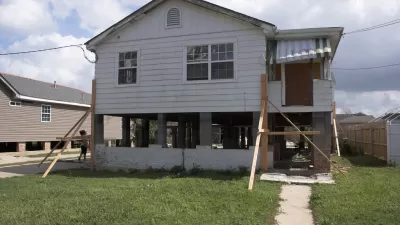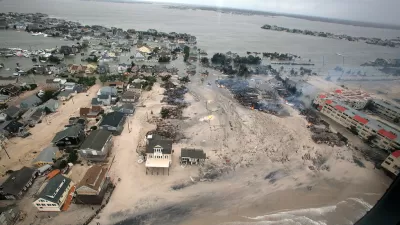Oregon Congressman Earl Blumenauer talks about the failures with federal natural disaster relief and how the country should build its resiliency to climate change with The Planning Report.
Over the past three decades, North America has seen a fivefold increase in weather-related natural disasters, with relief spending mirroring this exponential trend. As the population grows, the number of Americans residing in “at risk” areas along the coast, rivers, and in the “fire zone” also continues to rise. In the following The Planning Report interview, Oregon Congressman Earl Blumenauer explains why our current federal policy on natural disaster recovery is both fiscally unsustainable and life threatening.
Blumenauer suggests the changes in zoning, infrastructure investment, insurance, and taxation that must occur on a national scale in order to ensure a more resilient America better prepared for the climate changes we will inevitably face. The federal government is short-sighted when it comes to disaster relief and is unwilling to take money from the regular budget and devote that to mitigation. "At the same time, when we are investing in mitigation, in resiliency, in things that help make communities less disaster prone and that will unquestionably save three to five dollars or more for each dollar we spend, that comes out of the regular budget. It takes money away from defense, agriculture, and food inspection, and projects large and small."

Planetizen Federal Action Tracker
A weekly monitor of how Trump’s orders and actions are impacting planners and planning in America.

Map: Where Senate Republicans Want to Sell Your Public Lands
For public land advocates, the Senate Republicans’ proposal to sell millions of acres of public land in the West is “the biggest fight of their careers.”

Restaurant Patios Were a Pandemic Win — Why Were They so Hard to Keep?
Social distancing requirements and changes in travel patterns prompted cities to pilot new uses for street and sidewalk space. Then it got complicated.

Platform Pilsner: Vancouver Transit Agency Releases... a Beer?
TransLink will receive a portion of every sale of the four-pack.

Toronto Weighs Cheaper Transit, Parking Hikes for Major Events
Special event rates would take effect during large festivals, sports games and concerts to ‘discourage driving, manage congestion and free up space for transit.”

Berlin to Consider Car-Free Zone Larger Than Manhattan
The area bound by the 22-mile Ringbahn would still allow 12 uses of a private automobile per year per person, and several other exemptions.
Urban Design for Planners 1: Software Tools
This six-course series explores essential urban design concepts using open source software and equips planners with the tools they need to participate fully in the urban design process.
Planning for Universal Design
Learn the tools for implementing Universal Design in planning regulations.
Heyer Gruel & Associates PA
JM Goldson LLC
Custer County Colorado
City of Camden Redevelopment Agency
City of Astoria
Transportation Research & Education Center (TREC) at Portland State University
Camden Redevelopment Agency
City of Claremont
Municipality of Princeton (NJ)





























